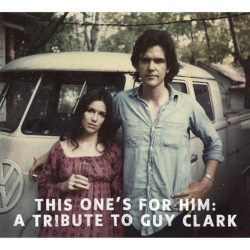
 Describing ‘This One’s For Him’ as a classic Americana album might seem surprising given it’s entirely made up of cover versions. Also, in no way does ‘This One’s For Him’ constitute a “breakthrough” moment in the history of Americana like – to cite an obvious case – Uncle Tupelo’s ‘No Depression’. Nor yet is ‘This One’s For Him’ one of those back-to-the-roots folk albums that a more mainstream artist like Bruce Springsteen occasionally pulls out of the hat and which, as said album soars to sales levels beyond the wildest commercial dreams of most Americana artists, is nevertheless dubbed “classic Americana” by the mass media.
Describing ‘This One’s For Him’ as a classic Americana album might seem surprising given it’s entirely made up of cover versions. Also, in no way does ‘This One’s For Him’ constitute a “breakthrough” moment in the history of Americana like – to cite an obvious case – Uncle Tupelo’s ‘No Depression’. Nor yet is ‘This One’s For Him’ one of those back-to-the-roots folk albums that a more mainstream artist like Bruce Springsteen occasionally pulls out of the hat and which, as said album soars to sales levels beyond the wildest commercial dreams of most Americana artists, is nevertheless dubbed “classic Americana” by the mass media.
Rather, ‘This One’s For Him’ deserves the moniker of “classic” for two straightforward reasons. Firstly, because a tribute album stretching across four decades of Guy Clark’s career and with 30 different songs by one of modern America’s greatest folk/country singer-songwriters all but inevitably acts as a rock-solid set of foundations for whatever finally gets created. In fact, if ‘This One’s For Him’ had turned out to be, say, something as improbable as 30 versions of Clark’s music by the world’s top 30 trash metal bands, such is the quality of the raw material song-wise that rather than getting mangled to bits by the headbangers, the end product’d still probably have come out ok.
Indeed, rather than mangled or distorted, the three dozen or so different Americana artists who rolled up for the best part of a year between January 2010 and the spring of 2011 in Austin and Nashville to record their tributes to Clark on ‘This One’s For Him’ have done their utmost to deliver some deeply respectful – and occasionally heartrendingly powerful – cover versions. You’d have to be made of stone not to be moved by John Prine and Emmy Lous Harris’ duet of Clark’s laments for lost loves on ‘Magnolia Wind’, to cite but one example of how good this album gets.
It has to be said that the rollcall of artists playing on ‘This One’s For Him’ is a stunning one, which is a direct testament to how deep and diverse an impact Clark had in his forty odd years of playing and recording. To name but a few – and it’s notable again, how representative of different strands and generations of Americana they are – Willy Nelson, Rodney Crowell, James McMurtry, Kris Kristofferson, Ray Wylie Hubbard, Steve Earle, Rosanne Cash, Hayes Carll, Robert Earl Keen, Jerry Jeff Walker and Lyle Lovett all pay their dues – and in the process offer a great introduction, if needed, to their own music as well.
But wherever they’re from and whichever generation to which they belong, the deep connections between all the people involved in the project and Clark and his music is palpable. Amazingly, those links are clear even before the songs kick in – like when we hear Crowell’s unforgettable spoken introduction to ‘Old Time Feeling’ of “Let’s give her a good go and make ol’ Guy proud of us…” or leaf through the brief but tellingly personal anecdotes from other artists on the sleeve notes. Amongst them, Vince Gill recalls how the lyrics of ‘Randall Knife’ about grieving for a father affected him so much when he was a guitarist 30 years earlier on the original Clark version and he had just lost his own dad, that he was reduced to tears whilst playing. Then 30 years later when Gill covers ‘Randall Knife’ on the tribute album, saying, “Me and Guy are tied at the hip through that song”- it makes for a very intense listen, to say the least, and adds to your appreciation of how much of a labour of love this album was, too.
To use ‘This One’s for Him’ to kick-start another round of the argument on whether an artist in some ways as inimitable as Clark can be bettered or improved on by covers totally misses the point. The album stays close enough to the originals to make you remember how good Clark’s own music is, but adds its own potent set of ingredients to it – which is as much (or as little if you’re being picky) that any great tribute album can do. For “proof” on ‘This One’s For Him’ you could pick pretty much any track but one personal favourite is ‘The Dark’, and the way Terri Hendrix smoothly but strongly builds up the song’s child-like sense of awe at how somebody’s imagination about places suddenly need have no boundaries, spiritual or physical, when the lights go down at the end of the day:
“How dark is it? It’s too dark for goblins / How dark is it? It’s so dark you can smell the moon / How dark is it? It’s so dark the wind gets lost / How dark is it? It’s so dark the sky’s on fire.”
The verse concludes by making even the mundane sight of a city seem something tremendous and half-way between magical and miraculous: “How dark is it? / It’s so dark you can see Ft. Worth from here”.
And the lines collectively lift the whole album, let alone this particular song, into another, spellbindingly beautiful, limitless, dimension. To quote one of Clark’s own songs, it’s ‘Stuff That Works’ – and on ‘This One’s For Him’, from beginning to end, it really does.


